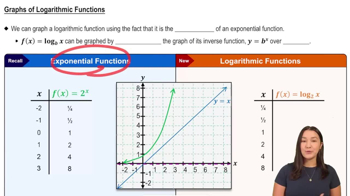Graph f(x) = 4x and g(x) = log4 x in the same rectangular coordinate system.
Table of contents
- 0. Review of Algebra4h 18m
- 1. Equations & Inequalities3h 18m
- 2. Graphs of Equations1h 43m
- 3. Functions2h 17m
- 4. Polynomial Functions1h 44m
- 5. Rational Functions1h 23m
- 6. Exponential & Logarithmic Functions2h 28m
- 7. Systems of Equations & Matrices4h 5m
- 8. Conic Sections2h 23m
- 9. Sequences, Series, & Induction1h 22m
- 10. Combinatorics & Probability1h 45m
6. Exponential & Logarithmic Functions
Introduction to Logarithms
Problem 25
Textbook Question
Solve each equation.
 Verified step by step guidance
Verified step by step guidance1
Recognize that the equation is given as \(x = 3^{\log_3 8}\), where the base of the exponent and the base of the logarithm are the same (both 3).
Recall the logarithmic identity: \(a^{\log_a b} = b\). This means that when the base of the exponent and the logarithm match, the expression simplifies directly to the argument of the logarithm.
Apply this identity to simplify \$3^{\log_3 8}$ to just 8.
Therefore, the value of \(x\) is equal to 8.
Conclude that the solution to the equation is \(x = 8\).
 Verified video answer for a similar problem:
Verified video answer for a similar problem:This video solution was recommended by our tutors as helpful for the problem above
Video duration:
2mPlay a video:
Key Concepts
Here are the essential concepts you must grasp in order to answer the question correctly.
Logarithmic and Exponential Functions
Logarithmic functions are the inverses of exponential functions. Understanding how these two relate helps in simplifying expressions like 3^log3(8), where the base of the exponent and the logarithm are the same.
Recommended video:

Graphs of Logarithmic Functions
Properties of Logarithms
Key properties such as log_b(b^x) = x and b^{log_b(x)} = x allow simplification of expressions involving logs and exponents with the same base. These properties are essential for solving equations like x = 3^{log_3(8)}.
Recommended video:

Change of Base Property
Evaluating Expressions with Matching Bases
When the base of the exponent matches the base of the logarithm, the expression simplifies directly to the argument of the logarithm. For example, 3^{log_3(8)} simplifies to 8, which is crucial for solving the given equation.
Recommended video:
Guided course

Evaluating Algebraic Expressions

 7:3m
7:3mWatch next
Master Logarithms Introduction with a bite sized video explanation from Patrick
Start learningRelated Videos
Related Practice
Textbook Question
940
views
